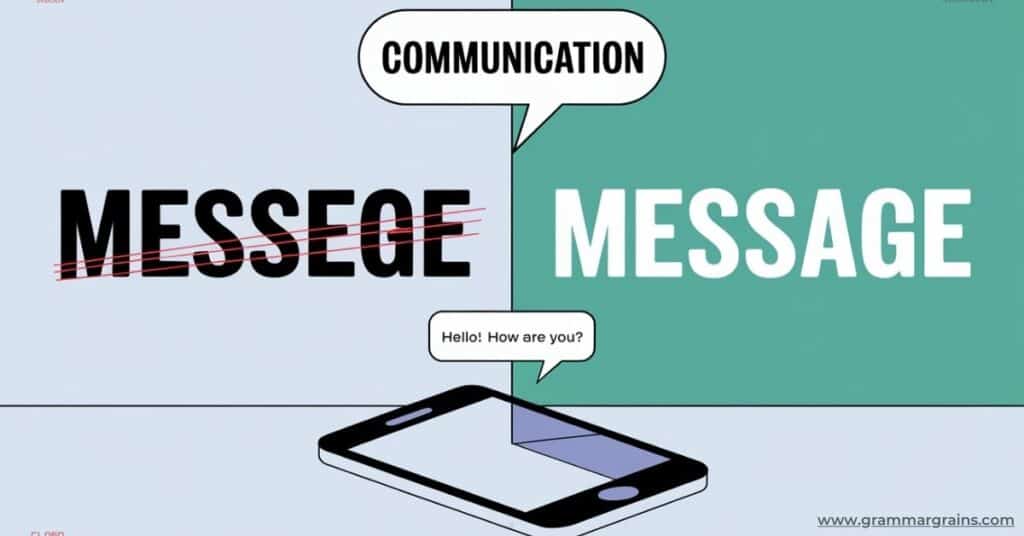Why Spelling Matters
Correct spelling is the cornerstone of effective communication, ensuring clarity and professionalism in both personal and professional contexts. Words like “message,” when spelled correctly, convey your thoughts with precision, while errors such as “messege” can lead to misunderstandings or diminish credibility. Whether you’re drafting an email, posting on social media, or sending a quick text, getting the spelling right is essential to maintaining the quality of your communication.
Have you ever considered how a single misspelled word can shape how others perceive you? In today’s digital age, where much of our interaction occurs online, spelling accuracy is more important than ever. This article explores the significance of correct spelling, common mistakes, and tips to avoid them.
Message vs. Messege: Unraveling the Confusion
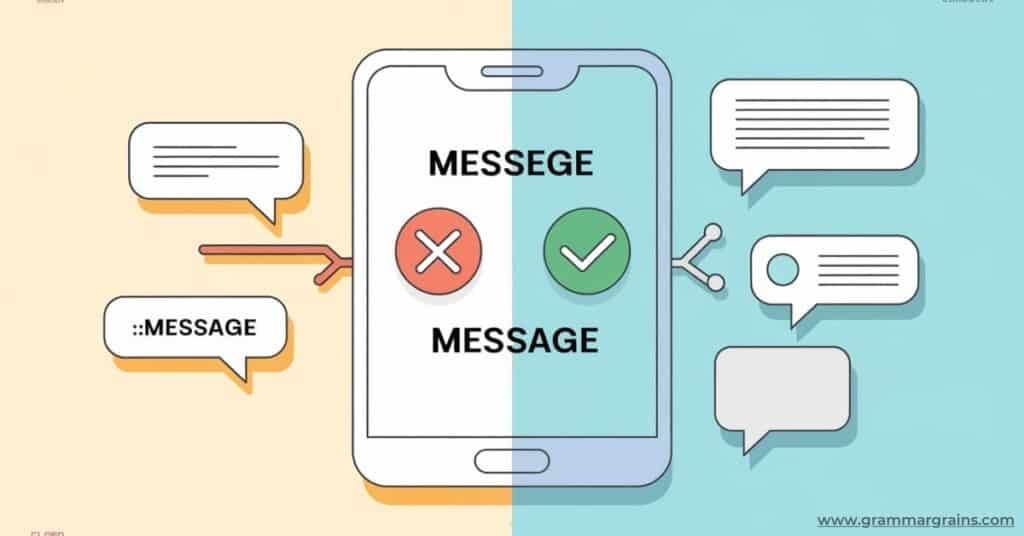
What Is the Correct Spelling: “Message” or “Messege”?
The correct spelling is “message.” It refers to any communication, typically sent from one person to another, and can be in the form of words, symbols, or even images.
The confusion surrounding “messege” likely comes from the way the word is pronounced.
In English, words don’t always reflect how they sound phonetically, and the pronunciation of “message” doesn’t match its spelling.
This phenomenon is not unique to “message” but is seen in many words in the English language.
“Messege,” though a common misspelling, does not exist in standard English dictionaries.
Its appearance in written communication is typically a result of phonetic confusion or typing errors, making it a frequent culprit in informal, rushed writing.
The fact that “messege” shows up so often is a reminder of the complexities of spelling in the English language, especially for those relying on their ear rather than their eye when it comes to writing.
Why Does “Messege” Keep Appearing?
Several factors contribute to the widespread occurrence of “messege” instead of “message.”
- Phonetic confusion: English is a language full of exceptions to pronunciation rules. The sound of the word “message” doesn’t necessarily match its spelling.
- While it might seem logical to spell the word with an “e” instead of the “a” in “message,” this is not the case.
- As a result, when people hear the word, they may instinctively spell it as “messege.”
- Autocorrect errors: We’ve all experienced the frustration of autocorrect failing us at the most inconvenient times.
- Sometimes autocorrect mistakes words by substituting them with alternatives that look or sound similar.
- While autocorrect is useful, it doesn’t always catch errors like “messege,” because it’s close enough to “message” in spelling and doesn’t always flag it as an issue.
- Typing mistakes: Modern communication often involves typing quickly on keyboards or phones.
- This speed can sometimes lead to small errors in spelling, especially with words that contain similar-sounding letters or combinations.
- If you’re typing fast, you might easily type “messege” when you intended to write “message.”
These factors make “messege” a common mistake, but they also highlight the importance of proofreading and being aware of the potential pitfalls when typing in a fast-paced, digital world.
The Correct Spelling: “Message”
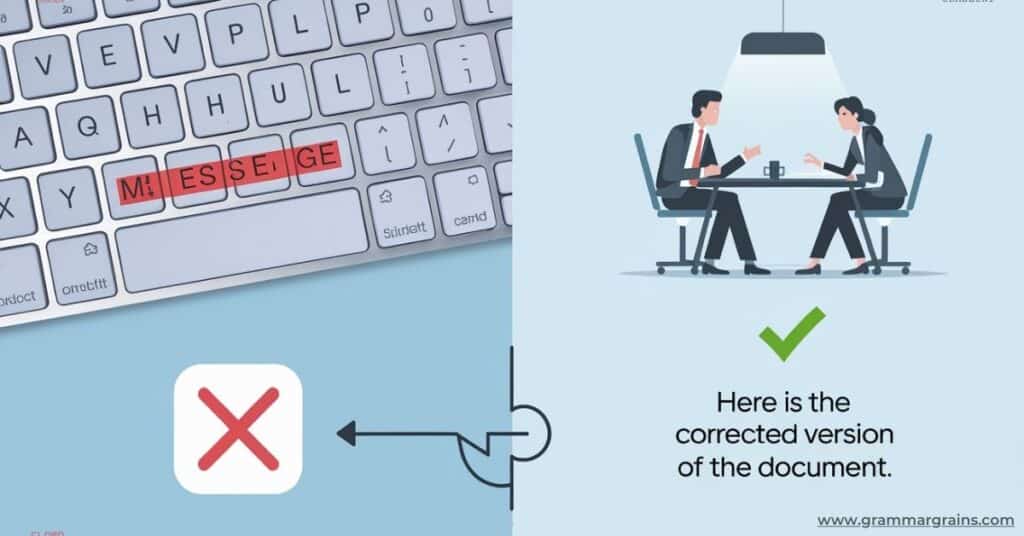
Definition and Usage of “Message”
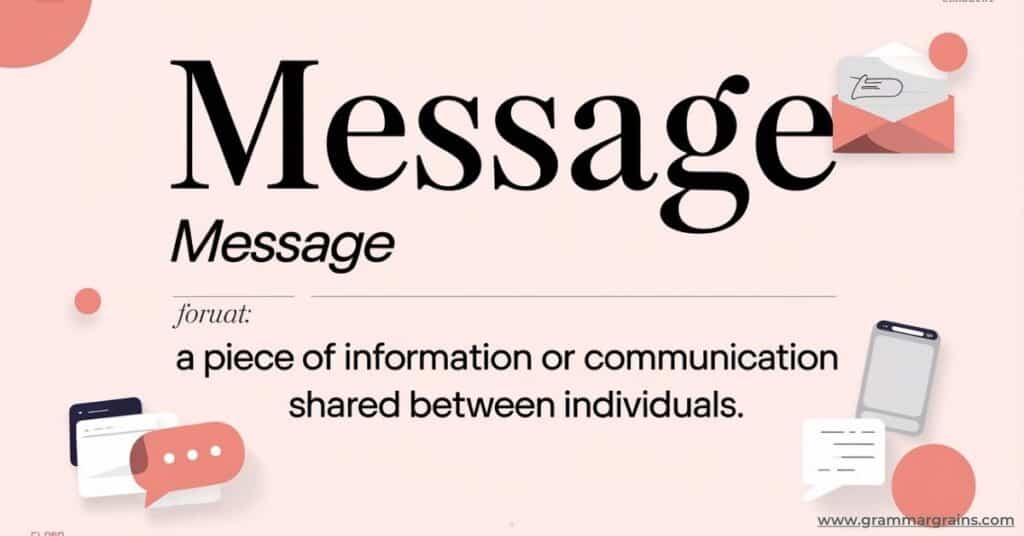
The word “message” is most commonly defined as a form of communication, whether verbal, written, or visual.
It refers to an idea or information conveyed from one person to another. In the context of digital communication, a message can be anything from a quick text to a detailed email.
It can be delivered in a variety of forms, including SMS communication, written letters, or through messaging apps.
For example, you might receive a text message from a friend about meeting for dinner, or a business message that informs you of a change in policy.
Here’s how the word “message” might be used:
- “I left a message on your voicemail.”
- “She sent me a message on Facebook.”
In the business context, “message” can refer to formal communication, such as an email, memorandum, or announcement. Ensuring the proper spelling of “message” in such situations is crucial for maintaining professionalism.
Common Mistakes: “Messege”
While “messege” is a common mistake, it’s important to address how this misspelling affects both informal and professional writing.
In personal communications, a small error might go unnoticed.
However, in a professional setting, using “messege” instead of “message” could create an impression of carelessness.
Take this example:
- Correct: “Please check your message inbox for the updated report.”
- Incorrect: “Please check your messege inbox for the updated report.”
In the first sentence, everything is clear and professional, while the second sentence appears sloppy and may cause the reader to question the writer’s attention to detail.
The Impact of Misspelled Words
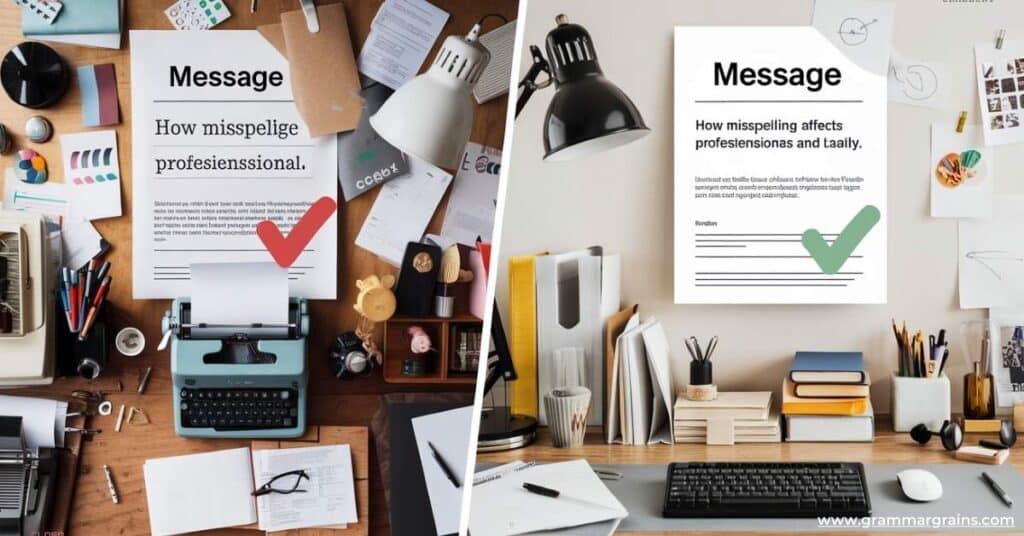
How Misspelling Affects Professionalism and Clarity
In the age of digital communication, where a lot of our interaction is text-based, spelling errors can have a significant impact on how we are perceived.
A misspelled word—even a simple one like “messege”—can leave a lasting impression, affecting how others perceive your professionalism, competence, and attention to detail.For instance, in a business email or formal letter, spelling mistakes can reduce the perceived quality of your communication.
If you were applying for a job, an email with spelling errors might suggest that you didn’t take the time to proofread or ensure your message was clear and precise.
This is especially important in industries where written communication is essential, such as law, marketing, and academia.
Consider these real-world examples:
- Correct usage: “The client has left a message about the upcoming meeting.”
- Incorrect usage: “The client has left a messege about the upcoming meeting.”
In both cases, the information is clear, but the first example presents the writer as more detail-oriented and professional.
Small errors like “messege” might not seem like much, but in the long run, they can have an impact on your reputation.
Real-World Examples: Correct and Incorrect Usage
Misspellings can sometimes have real-world consequences, especially when they occur in important contexts.
In a business setting, a minor mistake like “messege” could lead to miscommunication, delays, or errors in decision-making.
For example, imagine receiving a business proposal with the word “messege” instead of “message.”
If the spelling error is repeated throughout the document, the reader might assume that the entire document lacks attention to detail, making it harder to take the proposal seriously.
Similarly, in marketing materials, a spelling error in a headline or promotional content can confuse your audience and undermine the effectiveness of your campaign.
If you were launching an advertisement and used the incorrect spelling “messege” in a key phrase like “Send us a messege for more information,” potential customers might hesitate to trust the quality of your service or product.
Tips for Avoiding Spelling Mistakes
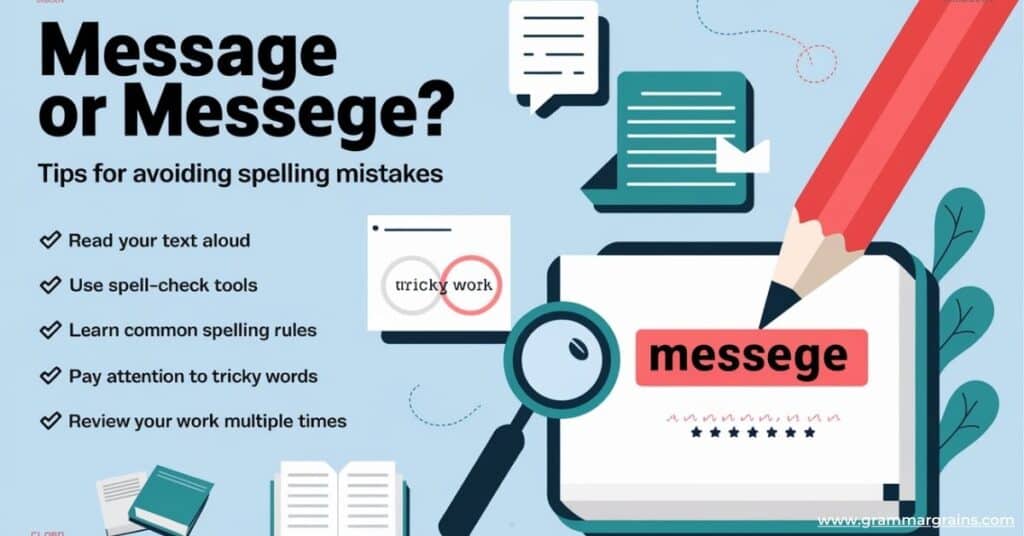
Proofreading Techniques
To avoid errors like “messege,” the best approach is thorough proofreading. After writing a message or document, always take a few moments to read through it again.
Reading aloud is a particularly effective technique because it forces you to pay more attention to the words. Your ear will naturally catch mistakes that your eyes might miss.
Also, giving yourself some distance from the text before proofreading can help.
If you write something and immediately try to proofread it, you might be too familiar with the content to spot errors.
Take a break, and then review it with fresh eyes.
Tools Like Autocorrect and Spell Check
In addition to manual proofreading, digital tools can help catch mistakes.
Spell checkers in word processing software or browsers can highlight words that are incorrectly spelled. While they are not foolproof, they offer a helpful safety net.
It’s essential to use these tools, but also to double-check their suggestions.
For example, autocorrect might suggest “messege” as the correct spelling, even if it’s wrong.
Ensuring that you verify these suggestions before accepting them is important for maintaining spelling accuracy.
Learning Commonly Confused Words
One effective way to minimize errors like “messege” is to study commonly confused words.
By memorizing the correct spelling and understanding the differences between similar words, you can reduce the likelihood of making mistakes. Words like “there,” “their,” and “they’re” or “its” and “it’s” are notorious for causing confusion.
Practicing these and becoming familiar with their usage can boost your language skills.
Building Better Writing Skills

Enhancing Your Spelling and Language Proficiency
Improving your spelling isn’t just about memorizing rules; it’s about developing strong language skills.
Reading regularly helps reinforce correct spelling and grammar.
The more you read, the more likely you are to encounter well-written material, which can subconsciously improve your writing skills.
Another great way to enhance your spelling is by writing daily. Start a journal or write short essays focusing on common spelling challenges.
By practicing writing and using words in context, you’ll reinforce the correct spelling of even the trickiest words.
How to Remember the Correct Spelling of “Message”
There are several techniques you can use to remember the spelling of words like “message.”
One helpful method is to create mnemonics—simple phrases or memory aids.
For example, you could remember “message” by associating it with the phrase “Make Every Statement Say Great Examples.”
This might help reinforce the proper spelling in your mind.
Repetition is also key. The more often you write the word “message” correctly, the more ingrained it becomes in your memory.
Don’t be afraid to write it out multiple times in various contexts until it feels natural.
The Evolution of Messaging
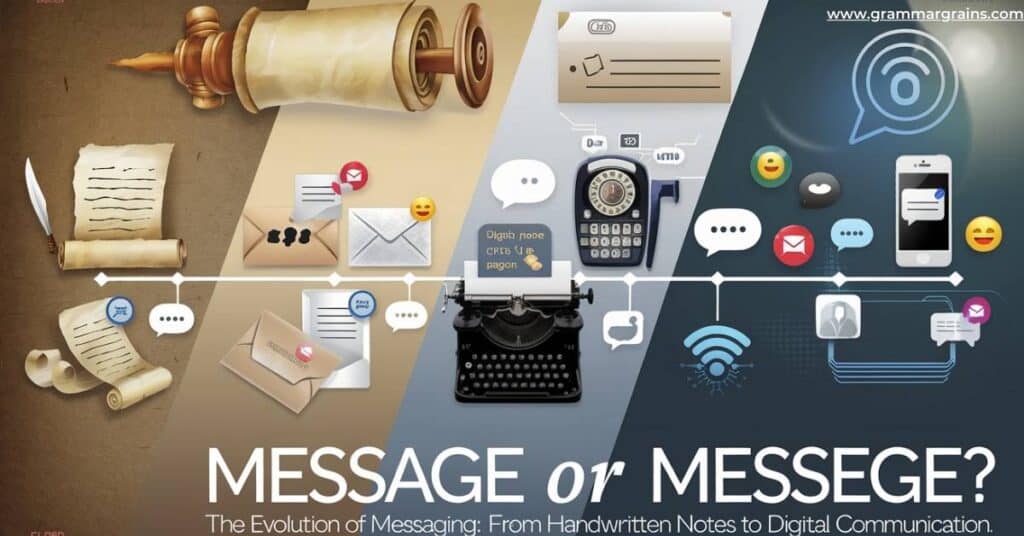
From Handwritten Notes to Digital Communication
The concept of messaging has come a long way from its origins. In the past, people communicated through handwritten letters, which could take weeks or even months to arrive.
Today, we live in an era of instant communication. Whether you’re sending a text message or an email, information is exchanged almost immediately.
This evolution of messaging technology has revolutionized how we work, socialize, and even learn.
No longer do we need to wait for days to receive important information; in today’s world, everything is at our fingertips.
Role of Technology in Global Communication
Modern communication technology has dramatically transformed global interactions.
The rise of social media platforms, instant messaging apps, and real-time notifications has made it easier to stay connected with people across the world.
Whether it’s a business message or a casual text to a friend, the speed and convenience of digital messaging have reshaped the way we communicate.
This shift in communication tools has had a profound impact on the global economy, education, and even politics.For example, social media messaging platforms have become vital in political campaigns, allowing candidates to connect with voters instantly.
Businesses use messaging apps to provide customer service in real-time, responding to questions and concerns efficiently.
Common Queries About “Message”
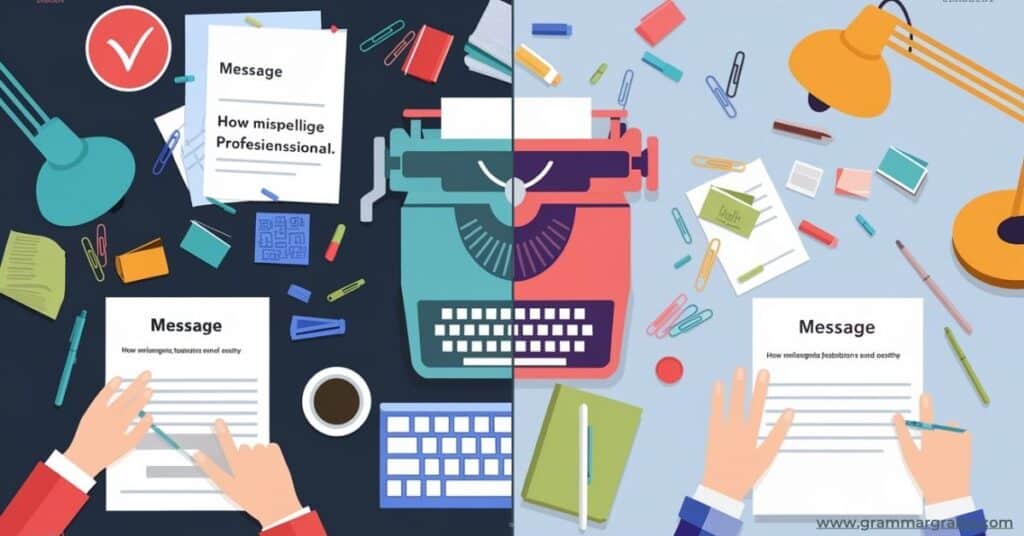
Difference Between “Message” and “Massage”
Though they look similar, “message” and “massage” are two completely different words with separate meanings.
A “message” is a communication, while a “massage” refers to a technique of rubbing and manipulating muscles to relieve tension or pain.
Understanding the distinction between these words helps avoid confusion.
For example, “I left a message for you” is quite different from saying “I left a massage for you,” a statement that would likely confuse anyone hearing it.
Practical Exercises to Improve Spelling
Improving your spelling requires time and practice. Here are some practical exercises to help you master words like “message”:
- Daily writing practice: Try writing short essays or journal entries that focus on commonly misspelled words.
- Spelling games: Apps like Scrabble or spelling quizzes can make learning more fun.
- Read aloud: Reading your work aloud can help catch spelling errors and ensure you’re using words correctly.
Conclusion
In conclusion, the debate of Message or Messege? Choosing the Correct Spelling for Clear Communication highlights the importance of spelling accuracy in digital communication. Whether you’re sending a quick SMS notification or drafting a professional email, the correct spelling ensures clarity and professionalism. Mistakes like “messege” can lead to confusion and affect the way your message is perceived.
Remember, effective communication relies on attention to detail. So, always proofread your messages and make use of tools like spell-check to avoid errors. Keep honing your language skills for clearer, more effective exchanges.
FAQs: How to Spell “Message”
- Message or Messege: Which Is Correct?
“Message” is the correct spelling. - How Do You Pronounce “Message”?
It’s pronounced as /ˈmɛs.ɪdʒ/, rhyming with “passage.” - Why Does “Messege” Appear?
Common reasons include phonetic confusion, typos, and reliance on autocorrect.

Taila Lucy, an expert content writer at Grammar Grains, brings 4 years of experience crafting engaging pieces on grammar. Her work delves into synonyms, antonyms, slang, puns, and poetry, helping readers master English with creativity and flair.
